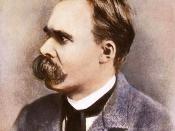The Truth Is Not Out There
Friedrich Nietzsche has perhaps been the most influential thinker of the 19th and 20th century. When Nietzsche proclaimed, "God is dead", it echoed around the whole world. His most famous works include The Birth of Tragedy, Ecce Homo, Beyond Good and Evil, Human, All Too Human, The Gay Science, and A Genealogy of Morals, in which he questions traditional thinking, religion, music, rationality and irrationality, culture, and ultimately the morals of mankind. Nietzsche as a man is a topic of debate for scholars everywhere. Every thinker has his or her own Nietzsche, as created by his letters, writings, and ultimately the manner of his downfall. Nietzsche's own view of himself is an even harder topic to grasp. To Nietzsche, rejection of "truth", which is tainted by society, customs, culture, and religion, was held sacred above all else. He upheld this sacred ideal in all aspects of his life, from his writings, to even his descent into madness.
Nietzsche is most famous for his quote "God is dead", from The Gay Science, which to many is a rejection of traditional and classical views regarding the way man's moral system works. He rejects classic organized religion, morals, tradition, and instead tried to focus on a more natural system of living one's life. Nietzsche, in his book Beyond Good and Evil quotes:
"It is probable that we too have still our virtues, although naturally they are not those sincere and massive virtues on account of which we hold our grandfathers in esteem and also at a little distance from us. We Europeans of the day after tomorrow, we firstlings of the twentieth century - with all our dangerous curiosity, our multifarious ness and art of disguising, our mellow and seemingly sweetened cruelty in sense and spirit -...



God is dead
THis essay is good, it has helped me understand nietzsche much better
2 out of 2 people found this comment useful.